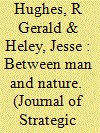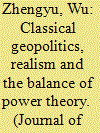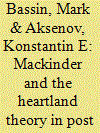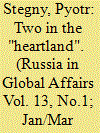|
|
|
Sort Order |
|
|
|
Items / Page
|
|
|
|
|
|
|
| Srl | Item |
| 1 |
ID:
141155


|
|
|
|
|
| Summary/Abstract |
This article argues for the continued relevance of the work and theories of the British Geostrategist Sir Halford J. Mackinder (1861-1947). It asserts that commentators and scholars who seek to marginalise Mackinder have too often dismissed his theories without setting them in the context of their continued endorsement in crucial areas of the globe. After 1945, despite his theories being tainted by association with Nazi Germany and Imperial Japan, both Moscow and Washington recognised the utility of Mackinder’s work and tailored policy accordingly. The end of Cold War saw Mackinder fall out of favour as his model was deemed unsuitable for policy analysis by a number of influential thinkers. It is argued here that, in recent years, the arena of international politics has seen a rehabilitation of Mackinder, accompanied by a resurgence of interest in Geopolitics. Finally, the piece examines those areas of the contemporary globe where Mackinder’s influence is greatest.
|
|
|
|
|
|
|
|
|
|
|
|
|
|
|
|
| 2 |
ID:
097139


|
|
|
|
|
| Publication |
2010.
|
| Summary/Abstract |
The books reviewed here deal with issues that are integral to the global problem of citizenship and its conceptual flow in time and space. Although not explicitly political, they point towards the difficulty of achieving liberal citizenship in illiberal societies where mass mobilization has often led to the decline of modernity and liberal institutions. Is it possible for people whose identities are radically different to share a common space to which they feel morally committed, without having to dissolve their differences? The stories of the rise and fall of 'heartlands' in Uttar Pradesh, struggling Christian minorities in Pakistan, and ownership of the Taj Mahal, a revered and much loved Islamic shrine in a primarily Hindu society, share this question in common. This new research agenda that these books generate has the potential for the construction of an indigenous and hybrid citizenship, and the reconfiguration of power under a different form of institutions and rules with no fixed, narrow, empirical referents, akin to the sense of belonging that visitors to the noble Taj celebrate, even though ever so fleetingly.
|
|
|
|
|
|
|
|
|
|
|
|
|
|
|
|
| 3 |
ID:
160636


|
|
|
|
|
| Summary/Abstract |
Since the end of World War II, classical geopolitics as a particular form of realism has been disengaged from the development of mainstream realist theories. This disengagement has not only concealed the value of classical geopolitics as a framework of analysis for policy and strategy, but also created an increasing rift between theory and policy in contemporary realist theories. This paper seeks to reengage classical geopolitics with mainstream realist theories by clarifying its realist traits and analytical characteristics, (re)stating its core propositions and probing into its potential contribution to the development of mainstream realist theories. This paper contends that classical geopolitics, while having a distinctive pedigree, can arguably be considered an integral part of the family of realist theories in view of its basic theoretical assumptions concerning international anarchy, the unit of analysis and power politics. As a framework of analysis, classical geopolitics incorporates three interrelated strategic propositions. Those three propositions not only constitute the theoretical core of classical geopolitics, but also manifest a peculiar balance-of-power conception that is essentially distinct from those proposed by mainstream realist theories. This paper argues that those three propositions combined promise to fill in prominent lacuna in the balance-of-power research programme, and also have significant implications for contemporary world politics.
|
|
|
|
|
|
|
|
|
|
|
|
|
|
|
|
| 4 |
ID:
071316


|
|
|
|
|
| Publication |
2006.
|
| Summary/Abstract |
This paper considers the ways in which Halford Mackinder's ideas are represented and mobilized in geopolitical discourses in post-Soviet Russia. Mackinder is broadly recognized as the most important proponent of 'classical' geopolitics, and his teachings about the Pivot of History and Heartland are referred to in virtually all geopolitical texts. Not all of this attention however is positive. We examine the very different ways in which Mackinder is deployed in this literature, and how he is re-signified to make his ideas relevant for contemporary Russia
|
|
|
|
|
|
|
|
|
|
|
|
|
|
|
|
| 5 |
ID:
171033


|
|
|
|
|
| Summary/Abstract |
Since the beginning of Thailand’s protracted political crisis in 2005, the country has experienced a conservative political turn centered on the monarchy. One of the regions where this turn has been most pronounced has been in southern Thailand. Studies of the south have tended to focus on the border provinces, its Malay Muslim community, and a long-running separatist movement. The more populous parts of the upper south with a Thai-Buddhist majority have been largely overlooked. In recent decades the south’s old Buddhist heartland has witnessed a high level of cultural and religious dynamism. This region has given birth to an influential new academic field of southern Thai studies and a distinctive southern Thai literature. These factors have contributed to the hardening of a southern Thai Buddhist identity. Politicians and activists from the south have played a prominent role in Thailand’s on-going political crisis. This article explores the rise of conservative radicalism in southern Thailand’s Buddhist heartland with reference to the roles of southern academics, writers, poets, activists, and politicians over the last half century. It offers a regional case study of the roots of Thailand’s political crisis as well as the rise of Buddhist radicalism in Southeast Asia.
|
|
|
|
|
|
|
|
|
|
|
|
|
|
|
|
| 6 |
ID:
138211


|
|
|
|
|
| Summary/Abstract |
Russian President Vladimir Putins visit to Turkey in December 2014 coincided with the anniversary of his first trip there in December 2004 and crowned a ten-year period of active relations between the two countries during "the Putin-Erdogan era." The results of Putins visit indicate that the current level of multifaceted partnership has not ended and could go further as elements of strategic cooperation emerge.
|
|
|
|
|
|
|
|
|
|
|
|
|
|
|
|
|
|
|
|
|